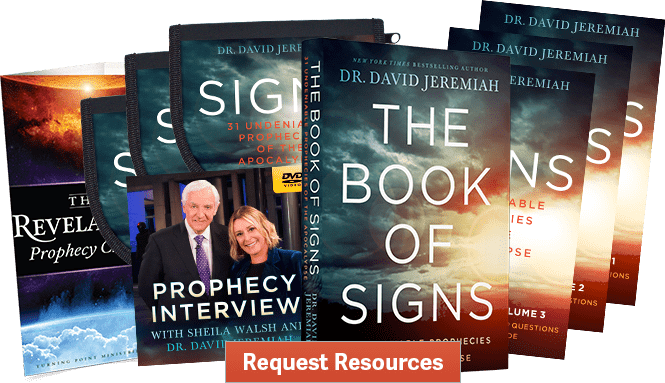

Dr. David Jeremiah Presents
Living inthe Ageof Signs
Online Destination

Living in the Age of Signs
Online Destination
The Second Coming of Christ Is Not Just an Event, It's the Central Theme of the Entire Bible
You have no doubt used one of the "mapping" features available on the internet—Google Maps is perhaps the most commonly used. It enables you to focus in on a particular location in the world, then pull back to see the larger view. You can go from a bird's–eye view to an airplane's view to a satellite's view. Truly amazing!
For example: You find Niagara Falls on Google Maps and, for the first time, you picture it as more than just a massive waterfall. You see its place on the Niagara River that divides Canada and the United States, flowing out of Lake Erie and into Lake Ontario. Who knew?
Or, when viewing Central Park in New York City, you zoom out and for the first time realize that Central Park is in Manhattan, which is surrounded by water on three sides. New York City is surrounded by water? Who knew?
Or maybe you're inspecting your own neighborhood—as you zoom out, you suddenly see geographic features you never knew were so close by: parks, lakes, great swaths of forest or rough terrain, or miles of rural roads perfect for biking. Who knew you lived in such an interesting place?
I'm sure you know the expression, "We couldn't see the forest for the trees"—meaning our perspective is so myopic (nearsighted) that we fail to see the big picture. We see our house, our street, and our town—but we don't see the world. We stand in front of a single tree and admire its uniqueness while failing to see the grandeur of the forest.
The Second Coming Is the Central Theme of All of Scripture
It's also possible to perceive a variety of biblical "trees" (details) while never gaining a clear picture of the "forest" (the big picture). We have favorite biblical characters and events, even favorite books of the Bible, but not always a clear understanding of God's big picture—what God is doing from Genesis to Revelation and every step along the way.
When it comes to the Bible, "all Scripture is given by inspiration of God, and is profitable" (2 Timothy 3:16). Jesus said every "jot" and "tittle" of God's revelation is important (Matthew 5:18). Following our trees and forest metaphor, that means every tree in Scripture is worth our detailed attention. There is nothing wrong with having favorite characters, events, books, and verses from the Bible. But we also need to understand how they all tie together.
Like a powerful telescope, the Bible is focused on one central theme, beginning at Genesis. Everything in Scripture is written to support that theme: To establish Jesus Christ as the rightful ruler over all of God's creation. From the very beginning, the Bible has focused on the final chapter and verse of the story. From the very beginning, and all along the way, the writers of Scripture have been writing about—generally or in detail, knowingly or unknowingly—what we call today "the End Times."
Therefore, the writers of Scripture have prepared the people of God for the climax of world history in which Christ will rule the world for a thousand years from His throne in Jerusalem.
Christ Is at the Beginning, the End, and Every Step in Between
Jesus Christ is "the Alpha and the Omega, the Beginning and the End, the First and the Last" (Revelation 22:13). That passage stands at the end of world history just as Genesis 3:15 stands at the beginning: "And I will put enmity between you and the woman, and between your seed and her Seed; He shall bruise your head, and you shall bruise His heel."
That verse, enigmatic when read by itself, is the first announcement that a descendant of Eve would come to destroy the serpent, Satan, whose temptations threw the world into ruin. As such, Bible scholars call it the protoevangelium—the first mention of the Gospel in the Bible. God says that the natural enmity between human beings and snakes will stand as a permanent reminder of the enmity between Satan and God—and a promise that the head of the serpent will one day be crushed by the wounded heel of a descendant of Eve (Revelation 12:14–15; 20:2).
That promise of God sets the stage for the rest of Scripture which John, the writer of Revelation, well understood. It was John who wrote that Jesus Christ came into the world "that He might destroy the works of the devil" (1 John 3:8). And it was John who saw, in his apocalyptic vision, Satan and his angels being cast down from heaven to earth (Revelation 12:7–9).
So Christ is the Beginning and the End of God's revelation concerning the beginning and the end of earth as we know it. All of the writers of Scripture contributed part of the story that is focused on the enthronement of Jesus Christ as King of kings and Lord of lords in the future (Revelation 19:16).
What the Prophets Detail About Christ's Second Coming
Following the words of God Himself in Genesis 3:15 concerning the future victory of the Messiah over Satan, God's subsequent writing prophets saw various dimensions of Jesus' life leading up to His eventual kingship at His Second Coming.
Key prophets. Both Zechariah (Zechariah 9:9) and an unnamed psalmist (Psalm 2:6) foresaw the coming of Christ as a King. Isaiah prophesied that the Messiah would come as a ruler who would bring peace and whose government will never end (Isaiah 9:6–7). Micah also saw the Messiah coming as a "Ruler in Israel" (Micah 5:2). Daniel envisioned the Messiah's future kingdom destroying all other kingdoms of this world (Daniel 2, 7) as well as the final judgment of all humanity (Daniel 12:2–3). Zechariah also wrote about many other facets of Christ's return to earth and the establishment of His earthly kingdom. Actually, it would be easier to write a short list of prophets who didn't prophesy about the End Times!
Key passages for the future. The prophet Daniel gave us more than one critical passage for students of the End Times to study. The interpretation of Nebuchadnezzar's dream provides a paradigm for Gentile kingdoms of the world that will be replaced by the kingdom of God's Messiah (Daniel 2:24–45). Daniel's prayer for forgiveness for Israel resulted in the vision of "Daniel's 70 Weeks"—an outline of the time of the Gentiles, the death of the Messiah, the treachery of the Antichrist, the persecution of Israel during the Tribulation, and the Antichrist's final judgment (Daniel 9:20–27). Malachi wrote a powerful description of Christ's Second Coming as Judge and King (Malachi 3:1–4). Isaiah's prophecies contain many classic passages concerning Christ and the End Times: universal peace (Isaiah 11), Tribulation troubles (Isaiah 24), Millennial blessings (Isaiah 35), the future glory of Jerusalem (Isaiah 60–62), coming judgment and salvation (Isaiah 63–65), and life under the Messiah's rule (Isaiah 65:17–24). Ezekiel's dramatic vision of the valley of dry bones pictures Israel's restoration (Ezekiel 37). And Zechariah saw multiple visions of the End Times: the blessing of Jerusalem (Zechariah 8), Israel's mourning at Christ's Second Coming (Zechariah 12:10–14), and Christ's return to the Mount of Olives in Jerusalem (Zechariah 14).
Key prophecies of the past. The prophecies concerning Christ's Second Coming are to be embraced faithfully because they are the last prophecies in a long line of hundreds of prophecies that have already been fulfilled concerning Christ's first coming. These prophecies and their fulfillment—concerning Christ's lineage, birth, ministry, death, and resurrection—are well known and serve as guarantees of the prophecies yet to be fulfilled.
Key purposes of God's writing prophets. A foundational verse concerning the purpose of God's writing prophets is Amos 3:7: "Surely the Lord God does nothing, unless He reveals His secret to His servants the prophets." Through His prophets, and later through the New Testament apostles' writings, God has given those who are spiritually hungry insights into the past, present, and future of His redemptive plan. Central to all His Word, from Genesis to Revelation, is the role of God the Son in restoring humanity and creation to a condition that brings eternal glory to the triune God.
As you read your Bible, relish the forest as well as the trees—the big picture of redemption as well as the details—so you will grow in appreciation for the centrality of Jesus Christ as we approach His Second Coming.



